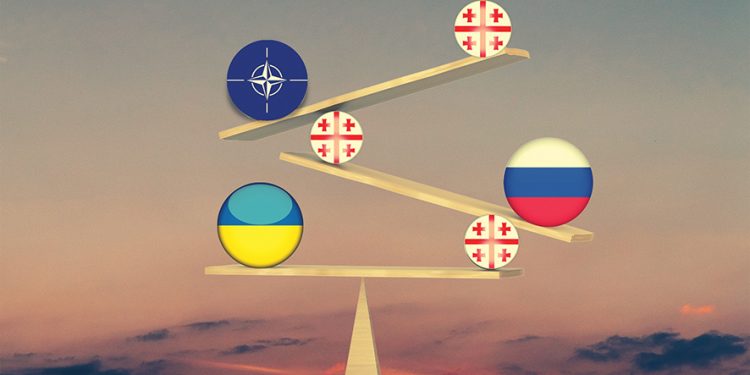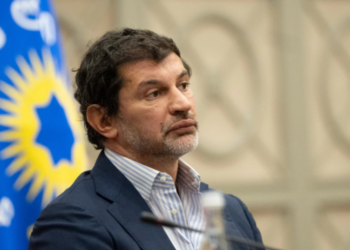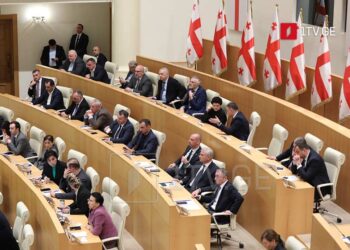One of the central topics of discussion in political, academic and analytical circles in the United States is the positioning of the US in the changing system of international relations. It is clear that this is not an abstract discussion for us, as it is directly related to the security of Georgia.
The unified security field for the US is now seen as comprising two distinct perimeters: internal and external. This shift reflects a new understanding of US national interests and resource allocation, moving away from the post-Cold War “America Everywhere” strategy, which necessitated US involvement in every conflict. Instead, a policy of selectivity has emerged, prioritizing regional challenges based on their importance to US interests. Countries within the internal security perimeter—those deemed geopolitically vital—will receive more substantial and systematic support. In contrast, the outer perimeter, associated with secondary interests, will see limited US political, military, and economic resources.
Thus, one of the main foreign policy objectives of official Tbilisi is to preserve and strengthen its place in the internal security perimeter and, consequently, its place in the sphere of essential geopolitical interests of the United States of America as the leader of the Western order. The need for this is dictated both by the Georgian security agenda and, as we have already mentioned, by the obvious interest of our country and its partners in regional stability.
In talking with Washington about such an engagement, the Georgian side should focus on the reciprocity of the issue, coincidence of interests and rational consideration. In this sense, American partners should well understand that effective support for Georgia’s security is not an act of charity. In fact, we are talking about the proper functioning of a state located on the external border of the Western political space, which will be properly motivated to protect and project both its own national interests and the joint interests of Georgia and the United States. Therefore, it should not be about the equation of the requestor and the contributor, but about agreeing on a joint agenda and putting it into practice. It is also clear that coordination between Georgia and the Western Alliance is a very complex political art. At such a time, many things, including the already mentioned “security dilemma” given the specifics of the region, require a thoughtful approach.
Otherwise, there is a high probability for us and our partners that Georgia will be left alone in the face of existing threats. A side effect of such result will be reputational damage of a strategic partner – not only in the eyes of Georgia, but also in the eyes of other allies. And given the extent of reputational damage, a negative outcome could escalate into a systemic security crisis. It should also be borne in mind that ceding US (and Western) positions in a country located on the dividing line of global geopolitical regimes makes their subsequent recovery and return much more difficult and costly.
In short, Georgia’s security should be seen in the unified context of US and Western security, without dividing or separating it. Along with Georgia’s efforts to follow this path, our strategic partners equally need to adapt more quickly and boldly to the policy of “strategic clarity” in the format of the wider Black Sea region.
When discussing the region, it’s essential to address Turkey as a distinct factor. In the broader Black Sea area and particularly in the South Caucasus, the regional dynamics are significantly shaped by Turkish political influence. Furthermore, in the context of unified security, it is crucial for official Tbilisi to recognize the importance of Turkey alongside the prominent American role. So, what can we say about the key characteristics of our neighbor’s policy toward the southern part of the region today?
Let me start with the fact that Turkey has individualized relations with almost all of its neighbors – based on a specific “case”. In addition, Ankara is guided by several key considerations regarding the wider Black Sea region, namely:
(a) The so-called “Regional Ownership”, which means that, above all, the countries of the region themselves should have a decisive voice in the politics of the region;
(b) Promoting multilateral formats of cooperation whenever possible (e.g., Black Sea Economic Cooperation Organization (BSEC), Black Sea Naval Cooperation Group (BlackSeaFor), etc.);
(c) Turkey’s “Balancing Act”, which implies organizing relations with the major actors in such a way that no single player acting separately gains superior control over the region.
Practically, from the perspective of recent years, it can be said that Turkey’s foreign policy is characterized by autonomy determined by its own situational interests. One of the hallmarks of this autonomy is that on all important issues on the regional agenda, Ankara usually tries to assert its role as one of the weighty negotiators in political and diplomatic communications.
As for direct Georgian-Turkish ties, from Turkey’s point of view, Georgia’s strong security system meets the interests of our neighbor. It is therefore no coincidence that the Turks have supported us over the years. Again, I would explain this support by Turkey’s pragmatic policy, for which:
(a) Georgia’s national security is a counterbalancing and stabilizing factor in regional security;
(b) A self-sufficient Georgian state is an unproblematic and predictable regional country between Turkey and Russia.
A few words about China: In terms of security, China emphasizes internal stability and the strength of specific political groups, contrasting with the U.S. focus on external security. This distinction presents a delicate issue for Georgia as it navigates its relationships with both the U.S. and China, both of which are significant but carry different implications. While Georgia values its economic and trade relations with China, the strategic and comprehensive partnership with the U.S. is crucial for its statehood.
Additionally, Georgia’s foreign policy must consider its connections with the Global South, especially highlighted by the ongoing war in Ukraine, which underscores the importance of this diverse group. Central to this coalition is India, whose influence in the South Caucasus is likely to grow, particularly through its ties with Armenia. This evolving relationship warrants further exploration.
And our focus on the Global South is due to the geopolitical “moderates” factor. Despite the abundance of political and governance formations within the grouping, given the current challenges, it is clear that the “Southerners” are maximizing their opportunities as well as rejecting geopolitically “monogamous” relationships.
This amorphous nature of the Global South is already having a considerable impact on the balance of power in the world; it is also likely to increase over time. And this is noteworthy for the predictability and planning of Georgia’s foreign policy and security line.
At the same time, we consider it an urgent task to intensify systematic communication with the Global South and cooperation on geopolitically “neutral” issues. In particular:
(a) Promotion of trade initiatives, including the introduction of preferences in trade;
(b) Discussing practical models for sustainable development, be it scientific or technical expertise capacity, technology exchange or other projects involving up-to-date knowledge and experience;
(c) Increased capacity to mobilize funds, including soft loans and grants.
Alliance and occupied territories
Violation of the territorial integrity of our country is referred to as one of the main obstacles to Georgia’s accession to the North Atlantic Alliance. Naturally, this is a real problem and no one disputes it. However, under current conditions, the occupied territories are just a pretext for those who avoid making result-oriented decisions for the purpose of NATO enlargement by making both Georgian and collective security interests even more vulnerable with declarations devoid of substance. And existing challenges will only get worse over time as a result of the bad practice of “doing less and acting slower than necessary.”
In the early years following the collapse of the Soviet Union, the North Atlantic Alliance’s focus on the post-Soviet space appeared to be well-founded. Various sources at the time discussed the need for NATO to adapt in order to prevent the violence and crises occurring in former Soviet republics from spilling over into Western Europe. Thus, NATO’s mission should have centered on crisis management rather than solely the defense of Alliance territory. This approach is reflected in the Partnership for Peace program initiated by President Clinton, which aimed to prepare post-Soviet countries for potential NATO membership, contingent upon meeting certain criteria.
Speaking of conditions, it is worth mentioning the so-called “Perry Principles” formulated by US Secretary of Defense Perry in the same 90s. This list is still relevant today, when we are discussing Georgia’s accession to the North Atlantic Alliance. These principles are as follows:
(1) Democratic governance;
(2) A free market economy;
(3) The rule of law;
(4) Ability to defend its territory, and
(5) Contribution to the collective defense of the Alliance.
Against the background of these principles, especially after the NATO Bucharest summit in 2008, the biggest obstacle to our country’s membership in the Alliance is its violated territorial integrity. However, it should be said that this issue is not and cannot be a formal basis for postponing NATO membership, but is still (at least before the war in Ukraine) rather a pretext for refusing to make productive decisions. And this is putting it mildly, and in more popular language it is called an “evasion”.
However, if there is political will on both sides, it is possible to find an adaptive solution to Georgia’s accession to the Alliance, let’s say “bypassing” the problem of Georgia’s temporarily occupied territories. In this publication we will name two practical experiences which, given the current situation between Georgia and Russia, are of interest.
(1) Norwegian precedent:
Prior to Norway’s formal membership in NATO, the Norwegian authorities pledged not to allow foreign military forces on Norwegian territory unless Norway was attacked or threatened with attack (this reservation was later extended to include the stationing of nuclear weapons in Norway).
The Norwegian precedent shows that a country bordering Russia can join NATO with reservations tailored to a specific example and unilateral commitments. The reservations made in the case of Norway served to reduce Russian risk and better address the “security dilemma” already mentioned in this publication.
(2) German precedent:
In contrast to Russia’s immediate neighborhood, the case of Germany illustrates how a divided country can still find one part included within NATO’s collective security framework. At first glance, this situation seems straightforward: the Federal Republic of Germany joined the Alliance, while the German Democratic Republic remained outside for clear reasons. However, a more complex issue arose regarding the interpretation of “clear borders” in relation to Article 5 of the NATO Founding Treaty. This is particularly noteworthy because it pertains to a nation split into two parts. Furthermore, West Germany officially characterized its border with East Germany as “temporary.”
The decision was defined in such a way that for the operation of Article 5, which requires a confined geographical area, a “clear border” may be “temporary” and need not be internationally recognized. As a result, collective security extends to a “temporary” border until the country’s territorial integrity is fully restored.
We cite these two precedents to illustrate that neither official Tbilisi nor its partners have valid reasons to oppose NATO’s expansion based on the existence of temporarily occupied territories. This is particularly pertinent given the increasing relevance of geopolitical dynamics, especially in light of current security developments.
In conclusion…
Georgia’s lasting security could not exist solely through military and geopolitical alliances, foreign ties and the country’s defense forces. The strength of all these components must have its origin in the “soft power” of the Georgian state.
And to provide security of a relatively high caliber, especially in an era of hard power dominance, Georgia’s soft power will be unequivocally identified with:
(1) The domestic political process and its characteristic values and principles;
(2) The legitimacy of the policies to be implemented at this or any subsequent stage, which is unthinkable without inclusiveness, consideration of the interests of those outside of power, and consolidation around a national and development-oriented agenda.
The phenomenon of “soft power” has historically played a role even when great powerful players had no shortage of hard power. Such was ancient Rome, with the appeal of its culture; This is what is being said about the US as an “empire by invitation” projecting appropriate standards; China is also trying to position itself with multi-billion dollar investments in the Belt and Road project.
“Soft power” is all the more relevant and practically useful for Georgia’s competitiveness and adaptability as a small/compact country. Therefore, the time has come for Georgian soft power to be conceptualized in policy guidance documents and become a condition for the success of practical policy.
Analysis by Victor Kipiani, Geocase Chairman














